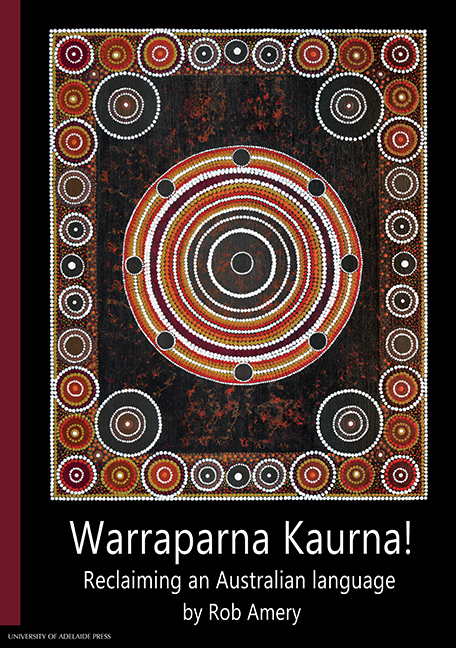Book contents
- Frontmatter
- Contents
- Maps, Plates, Graphs and Tables
- Preface to this Edition (2016)
- Foreword to the 2000 Edition
- Preface to the 2000 Edition
- Acknowledgements
- Abbreviations
- Conventions and Terminology
- Chapter 1 Locating the Study
- Chapter 2 Language Reclamation
- Chapter 3 An Ecological Approach to Language Revival
- Chapter 4 A Sociolinguistic History of Kaurna
- Chapter 5 Kaurna Sources
- Chapter 6 Restoring and Transforming the Kaurna Language
- Chapter 7 Kaurna Language Programs
- Chapter 8 Kaurna in Society
- Chapter 9 Kaurna Language Revival: The Formulaic Method
- Chapter 10 Sociopolitical Dimensions of Kaurna Language Revival
- Chapter 11 Into the Twenty-first Century: Developments since 2000
- Chapter 12 Summary and Conclusions
- Bibliography
- Index
Conventions and Terminology
Published online by Cambridge University Press: 28 July 2017
- Frontmatter
- Contents
- Maps, Plates, Graphs and Tables
- Preface to this Edition (2016)
- Foreword to the 2000 Edition
- Preface to the 2000 Edition
- Acknowledgements
- Abbreviations
- Conventions and Terminology
- Chapter 1 Locating the Study
- Chapter 2 Language Reclamation
- Chapter 3 An Ecological Approach to Language Revival
- Chapter 4 A Sociolinguistic History of Kaurna
- Chapter 5 Kaurna Sources
- Chapter 6 Restoring and Transforming the Kaurna Language
- Chapter 7 Kaurna Language Programs
- Chapter 8 Kaurna in Society
- Chapter 9 Kaurna Language Revival: The Formulaic Method
- Chapter 10 Sociopolitical Dimensions of Kaurna Language Revival
- Chapter 11 Into the Twenty-first Century: Developments since 2000
- Chapter 12 Summary and Conclusions
- Bibliography
- Index
Summary
Unless otherwise specified, Kaurna words are taken from Teichelmann & Schürmann (1840) or Teichelmann (1857) or formed according to wordbuilding patterns laid down in these sources. Language materials produced in association with school programs or community events all employ these spellings.
Unless otherwise specified, contemporary Kaurna neologisms, new expressions, translations and other Kaurna language products cited were developed by me, typically within a classroom or workshop situation where Kaurna people have been present and have been part of the process. Often the Kaurna texts are negotiated and always open to change and revision, subject to feedback from members of the Kaurna community.
Neologisms not in the historical sources are identified with an asterisk*. Inflected or derived forms, e.g. kangkutha ‘will look after’ or narna-ana ‘to the door’, many of which will not be found as such in the historical sources, have not been identified in any special way as their formation is predictable. Borrowings from other languages have been identified with ° before the word.
I use italics for words taken from Indigenous languages as they appear in their original sources. Phonetic and phonemic representations of Kaurna words are written without italicisation within square [] and slash / / brackets respectively. Names are written without italicisation as in general usage.
Language names are spelt according to local community preferences. A range of spellings of these names are to be found in the literature. The preferred spelling of Narungga has changed recently from Narrunga, which appears in a number of quite recent publications and DETE Aboriginal Studies materials.
I privilege the use of Indigenous terms. I refer to Kaurna individuals by their Kaurna names, where these are known. For instance, I use Kadlitpinna rather than ‘Captain Jack’, even though he is almost always referred to by his English name in the literature. Similarly, I use Piltawodli, Bukkiyana and Raukkan in preference to ‘Native Location’, Point Pearce and Point McLeay respectively. This often results in a disparity between the names as they appear in my text and in quotations. Local Aboriginal people from Adelaide and surrounding areas are often referred to as Nungas, their term of self-ascription. The term Nunga covers Aboriginal people belonging to a range of southern South Australian language groups, including Kaurna, Narungga and Ngarrindjeri.
- Type
- Chapter
- Information
- Warraparna Kaurna!Reclaiming an Australian language, pp. xxxii - xxxiiiPublisher: The University of Adelaide PressPrint publication year: 2016

